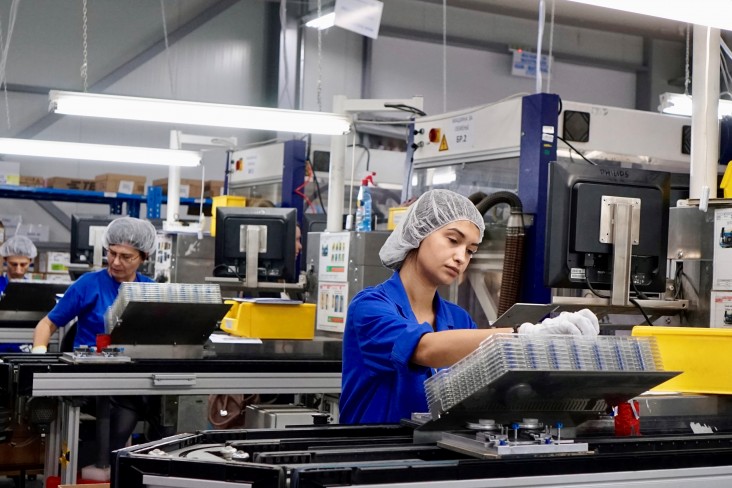Speeches Shim

AMPHENOL SETS AN EXAMPLE FOR PRIVATE SECTOR INVESTMENT IN YOUTH
“By investing in the development of our workforce, we invest in our own success.”
June 2020 – Amphenol, one of the largest manufacturers of electronic and fiber optic connectors in the world -- headquartered in Wallingford, Connecticut, was looking for talent in its production plant located in Kochani, North Macedonia. Amphenol chose North Macedonia as a base for reaching the European market. North Macedonia’s favorable legislative framework for foreign direct investment was a key attraction – a result of a decade-long effort to promote an enterprise-driven economy.
Amphenol targeted the local vocational high school “Gjoshe Vikentiev” to hire staff but quickly realized that graduates lacked the practical skills needed to work at the plant. Amphenol took a proactive approach to fill the skills gap. The company piloted a “training for employment” program within the school. “We renovated and equipped a whole part of the school building for training and certification,” said Sashko Nakov, Amphenol’s manager. Recognizing the promise of Amphenol’s approach, USAID co-financed the pilot program.
Unemployment is one of the most persistent challenges to a vibrant economy in North Macedonia. Young adults are particularly affected – in 2019, the youth unemployment rate was 34%. Paradoxically, thousands of jobs remain unfilled. The private sector’s main concern is not creating new jobs, but rather filling existing positions with skilled workers. Companies struggle to recruit workers with the technical skills needed to start working immediately.
Amphenol CEO ABC explained that Once we started this, we realized that many trainees had immense potential. All candidates who successfully passed the training were offered a job at Amphenol. Most of them are still employed right here.” He underscored that USAID’s involvement was crucial to the partnership with the school, minimizing the company’s risk by sharing the total costs of the initiative. The success of the pilot program stimulated both Amphenol and the school to continue investing in their partnership, independent of direct USAID support.
“By investing in the development of our workforce, we invest in our own success,” adds Sashko.
Amphenol’s training programs are now open for a wider population, including people who need on-the-job requalification. Goce Savev, the current principal of the vocational high school “Gjosho Vikentiev”, has witnessed the transformation of his school since the time he was a student over 30 years ago. When he took over as principal, one of his goals was to create innovative opportunities for students to connect with local companies. “Undoubtedly, theoretical learning is important. Still, students need to acquire practical knowledge and hands-on experience to become employable,” says Goce. “We learned a lot from USAID’s approach. Now we are working on partnering with more companies,” he added.
A skilled workforce is at the core of a strong and sustainable enterprise-driven economy. The USAID Business Ecosystem Project partners with companies to increase the employability of the workforce and strengthen their supply chains. Through the project, companies have invested over $6.1 million to date in local economic initiatives. Launched in 2017, the USAID Business Ecosystem Project increases productivity, revenues, and jobs for micro-, small- and medium-sized enterprises, by building a responsive and sustainable business ecosystem. The project partners with government institutions to better promote their programs to support competitiveness, innovation, entrepreneurship and workforce development and adapt to the needs of MSMEs.

Comment
Make a general inquiry or suggest an improvement.